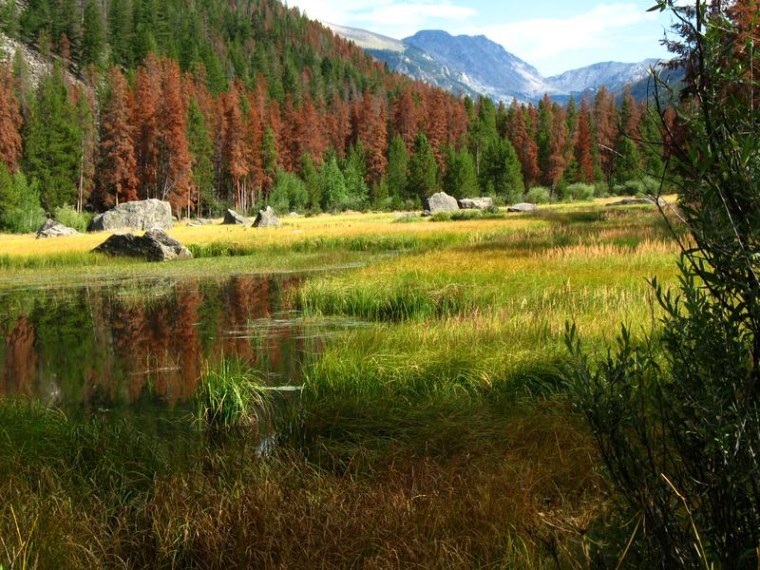The current scourge of the Rocky Mountain region — the mountain pine beetle — has been decimating lodgepole pine populations, leaving millions of acres of dead trees in its wake throughout western North America.
Now, researchers are predicting that on top of disrupting the timber industry and crafting the depressing vistas of dead trees that now welcome tourists, the infestation may alter the weather and affect the region's air quality.
"With this unprecedented bark beetle outbreak, there really is the potential for large-scale changes to the forest with respect to weather and air quality," said Alex Guenther, the leader of ongoing research at the National Center for Atmospheric Research in Boulder, Colo.
"Modeling shows that the extent of the outbreak already is enough to change the temperature," he said, by perhaps two to four degrees Fahrenheit over the short term.
The researchers will improve their initial modeling efforts with laboratory studies, outdoor data-collection stations on the ground, and aircraft measurements. They plan to monitor local weather, moisture, organic compounds and particles in the air, carbon exchange between the land and the air, and more.
Impact on cooling, ozone
Removing the forest will change the amount of sunlight that reaches the ground and the degree of cooling provided by the plants' release of water. The trees also give off small particles, like pollen, and volatile organic compounds that can react in the atmosphere to form additional small particles and the pollutant ozone.
The particles can provide sites for water vapor to stick, forming clouds. In addition to affecting the weather, elevated concentrations of small particles can also increase incidence of respiratory and heart problems.
The researchers can't yet predict whether the forest changes will result in a net increase or decrease of particles or ozone, or exactly how the changes will affect the weather.
When beetles first attack a tree, the tree emits large concentrations of volatile organic compounds, so particle and ozone concentrations may rise initially. Since many interactions are involved, experiments will be necessary to see which forces are most important, Guenther said.
Ground stations await beetles
It is also not known how these factors will change as the trees decompose, he said, but further study should allow the researchers to capture these changes. The ground stations in the study are in places the beetles are expected to invade in the next year or two and should help resolve those questions.
"It's really valuable stuff," said Steven Seybold of the U.S. Department of Agriculture Forest Service in Davis, Calif. Understanding the carbon dioxide emissions resulting from widespread tree loss is another important aspect of the research, he added, pointing to a study earlier this year estimating almost 300 megatons of climate-warming CO2 will be released by beetle-killed trees in British Columbia between 2000 and 2020.
"Most forest biologists or forest entomologists feel that the changes we're seeing are kind of unprecedented in terms of the size of the outbreaks and their locations," he said. The infestations are both further north and at higher elevation than have been seen before, he said.
The coincidence of drought, prevalence of uniformly old forests, lack of fire and warmer winter temperatures have combined to create the ideal conditions for the outbreaks, he and others said.
"We need to study these changes," said Ingrid Aguayo of the Colorado State Forest Service in Fort Collins, Colo. "At the same time, fires and bark beetles in the west are part of the natural cycle of these forests. This provides an opportunity for us to promote more forest management to minimize these in the future."
